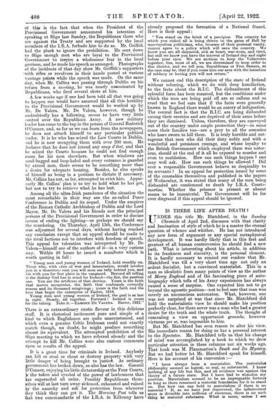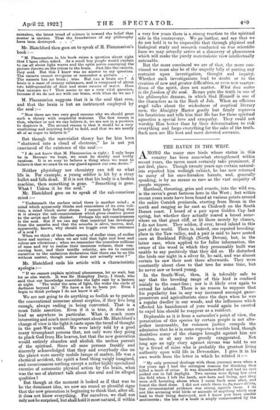IS THERE LIFE AFTER DEATH U NDER this title Mr. Blatchford,
in the Sunday Chronicle of April 2nd, discusses with that clarity and fascination of style of which he is a master the eternal question of whence and whither. He has not introduced any new form of argument or any special metaphysical development. It was hardly likely that in this first and greatest of all human controversies he should find a new path. What is interesting about his article, in addition to its frankness and sincerity, is the personal element. It is hardly necessary to remind our readers that Mr. Blatchford was till a very short time ago not only an ardent Socialist, but a convinced materialist. This in a man so idealistic from many points of view as the author of Merry England and of the fascinating piece of auto- biography which tells of his Army experiences has always caused a sense of surprise. One expected him not. to go beyond the agnostic position—not to feel sure that man was merely an unconscious automaton. What, however, one was not surprised at was that since Mr. Blatchford did hold the materialistic view he should make his position perfectly clear, for there never was a man who had a greater desire for the truth and the whole truth. The thought of concealing a view on opportunist grounds, however virtuous per se, was impossible to him. But Mr. Blatchford has seen reason to alter his view. His immediate reason for doing so has a personal interest to the Spectator. Mr. Blatchford tells us that his change of mind was accomplished by a book to which we drew particular attention in these columns not six weeks ago. That book was M. Flammarion's Death and Its Mystery. But we had better let Mr. Blatchford speak for himself. Here is his account of his conversion :- " I have always been a materialist. The materialist philosophy seemed so logical, so real, so substantial. I knew nothing of any life but this, and all evidence was against the theory of a future state. But I have had to abandon my position. Materialism seemed to be an impregnable fortress so long as there remained a material foundation for it to stand on. But how can one hold to materialism if there is no material ? If, as we have just discovered, the infinitesimal atom is divisible into millions of electrons, there is no such thing 'as material substance. What is more, - unless I am
mistaken, the latest trend of science is toward the belief that -matter is motion. Thus the foundations of my philosophy have been destroyed. . . ."
Mr. Blatchford then goes on to speak of M. Flammarion's book :—
" M. Flammarion in his book raises a question about sight that I have often asked. As a small boy people would explain to me all about light waves and the optio nerve conveying the picture thrown on the retina to the brain. Just like the camera, they said. But this I knew was no answer to my question.
The camera cannot recognize or remember a picture. . The camera has no brain ; true. But can a brain sea ? A brain is a mass of creamy substance, and is composed of about two tablespoonfuls of dust and some ounces of water. D003 that mixture see ? That seems to me a very vital question, because if we do not sea with our brain, with what do we see ?
M. Flammarion suggests that it is the soul that sees, and that the brain Is but an instillment employed by the soul :— " Now there are two very good reasons why we should greet suoh a theory with respectful welcome. The first reason is that, whether or not we can believe it, we are not in a position to disprove it. The second reason is that it would bo a very comforting and inspiring belief to hold, and that wo are nearly all of us eager to believe it."
But though the materialist theory has for him been " shattered into a cloud of electrons," he is not yet convinced of the existence of the soul :- " I do not know that M. Flammarion is right ; I only hope he is. Because we hope, we must be doubly and trebly cautious. It is so easy to believe a thing when wo want to believe it that we must be on our guard against our own desire."
Neither physiology nor chemistry can tell us what life is. For example, a young soldier is hit by a stray bullet and falls dead. If it is not that his body is a broken machine, then something is gone. " Something is gone. What Unless it be the soul."
Mr. Blatchford goes on to speak of the sub-conscious mind :— " Underneath the surface mind there is another mind ; a mind which apparently thinks and remembers of its own voli- tion, a mind which never sleeps. I cannot help feeling that it is always the sub-consciousness which gives creative power to the artist and the thinker. Perhaps the sub-consciousness is the soul. But if we can say that mankind has developed from the amoeba and that the amoeba is alive, -moves, and, apparently, knows, why should we boggle over tho existence of a soul ?
When we think of the stellar spaces, of stellar time, of stellar force and motion ; when we are told that light and heat and colour are vibrations ; when we remember the countless millions of suns and try to realize their immense volume, their con- suming heat, and their terrific velocity, are we to commit ourselves to the audacious declaration that there can be no life without matter, though matter does not actually exist ? "
Mr. Blatchford ends his article with a characteristic apologia :— " If we cannot explain spiritual phenomena, let U3 wait, but let us also watch. It was Sir Humphry Davy, I think, who said that our knowledge resembles the light cast by a lantern at night. "Fhe wider the area of light, the wider the circle of darkness beyond it.' We have a lot to learn yet. Even I begin to think perhaps I do not know it all."
We are not going to do anything so foolish as to parade the conventional nonsense about sceptics, if they live long enough, always ending in being converted. That is a most futile assertion. Even if it is true, it does not lead us anywhere in particular. What is much more interesting and much more important about Mr. Blatchford's change of view is the light it casts upon the trend of thought in the post-War world. We were lately told by a good many triumphant persons that, not only were they going to pluck God from His heaven, but that the new generation would entirely abandon and abolish the useless pursuit of the spiritual. Since all sane persons frankly and sincerely acknowledged that they and everybody else on the planet were merely mobile lumps of matter, life was a chemical accident, the spirit a fond thing vaiqly imagined, and consciousness nothing except a rather highly specialized exercise of automatic physical action by the brain, what was the use of abstract talk about the soul and its alleged qualities 1 But though at the moment it looked as if that was to be the dominant idea, we now see round us plentiful signs that the new generation is beginning to think that, after all, it does not know everything. For ourselves, we shall not only not be surprised, but shall hold it most natural, if within a very few years there is a strong reaction to the spiritual side in the controversy. We go further, and say that we do not hold it to be impossible that through physical and biological study and research conducted on true scientific lines we may actually arrive at a discovery of phenomena which will make the purely materialistic view intellectually untenable.
But the more convinced we are of that, the more con- vinced we must also be of the ungodly folly of putting any restraint upon investigation, thought and inquiry. Whether such investigations lead to doubt or to the creation of new and greater difficulties, or even new martyr- dom of the spirit, does not matter. What does matter is the freedom of the soul. Renan puts the truth in one of his philosophic dramas, in which God Himself is one of the characters as in the Book of Job. When an officious angel talks about the wickedness of sceptical literary men, the Almighty Master gently but firmly reproves his fanaticism and tells him that He has for these spiritual agnostics a special love and sympathy. They could not worship Him better than by their determination to risk everything and forgo everything for the sake of the truth. Such men are His best and most devoted servants.



































 Previous page
Previous page